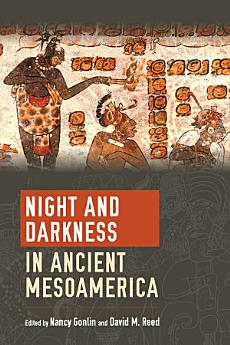Night and Darkness in Ancient Mesoamerica
Nancy Gonlin · David Millard Reed
Dec 2021 · University Press of Colorado
Ebook
369
Pages
family_home
Eligible
info
reportRatings and reviews aren’t verified Learn More
About this ebook
Night and Darkness in Ancient Mesoamerica is the first volume to explicitly incorporate how nocturnal aspects of the natural world were imbued with deep cultural meanings and expressed by different peoples from various time periods in Mexico and Central America. Material culture, iconography, epigraphy, art history, ethnohistory, ethnographies, and anthropological theory are deftly used to illuminate dimensions of darkness and the night that are often neglected in reconstructions of the past.
The anthropological study of night and darkness enriches and strengthens the understanding of human behavior, power, economy, and the supernatural. In eleven case studies featuring the residents of Teotihuacan, the Classic period Maya, inhabitants of Rio Ulúa, and the Aztecs, the authors challenge archaeologists to consider the influence of the ignored dimension of the night and the role and expression of darkness on ancient behavior. Chapters examine the significance of eclipses, burials, tombs, and natural phenomena considered to be portals to the underworld; animals hunted at twilight; the use and ritual meaning of blindfolds; night-blooming plants; nocturnal foodways; fuel sources and lighting technology; and other connected practices.
Night and Darkness in Ancient Mesoamerica expands the scope of published research and media on the archaeology of the night. The book will be of interest to those who study the humanistic, anthropological, and archaeological aspects of the Aztec, Maya, Teotihuacanos, and southeastern Mesoamericans, as well as sensory archaeology, art history, material culture studies, anthropological archaeology, paleonutrition, socioeconomics, sociopolitics, epigraphy, mortuary studies, volcanology, and paleoethnobotany.
Contributors: Jeremy Coltman, Christine Dixon, Rachel Egan, Kirby Farah, Carolyn Freiwald, Nancy Gonlin, Julia Hendon, Cecelia Klein, Jeanne Lopiparo, Brian McKee, Jan Marie Olson, David M. Reed, Payson Sheets, Venicia Slotten, Michael Thomason, Randolph Widmer, W. Scott Zeleznik
The anthropological study of night and darkness enriches and strengthens the understanding of human behavior, power, economy, and the supernatural. In eleven case studies featuring the residents of Teotihuacan, the Classic period Maya, inhabitants of Rio Ulúa, and the Aztecs, the authors challenge archaeologists to consider the influence of the ignored dimension of the night and the role and expression of darkness on ancient behavior. Chapters examine the significance of eclipses, burials, tombs, and natural phenomena considered to be portals to the underworld; animals hunted at twilight; the use and ritual meaning of blindfolds; night-blooming plants; nocturnal foodways; fuel sources and lighting technology; and other connected practices.
Night and Darkness in Ancient Mesoamerica expands the scope of published research and media on the archaeology of the night. The book will be of interest to those who study the humanistic, anthropological, and archaeological aspects of the Aztec, Maya, Teotihuacanos, and southeastern Mesoamericans, as well as sensory archaeology, art history, material culture studies, anthropological archaeology, paleonutrition, socioeconomics, sociopolitics, epigraphy, mortuary studies, volcanology, and paleoethnobotany.
Contributors: Jeremy Coltman, Christine Dixon, Rachel Egan, Kirby Farah, Carolyn Freiwald, Nancy Gonlin, Julia Hendon, Cecelia Klein, Jeanne Lopiparo, Brian McKee, Jan Marie Olson, David M. Reed, Payson Sheets, Venicia Slotten, Michael Thomason, Randolph Widmer, W. Scott Zeleznik
About the author
Nancy Gonlin is a Mesoamerican archaeologist who specializes in daily and nightly practices, household studies, and inequality. She is editor-in-chief of Ancient Mesoamerica, and her publications include the coedited volumes Commoner Ritual and Ideology in Ancient Mesoamerica, Ancient Households of the Americas, Human Adaptation in Ancient Mesoamerica, and Archaeology of the Night. She is coauthor of Copán: The Rise and Fall of an Ancient Maya Kingdom and The Archaeology of Native North America, 2nd ed. Gonlin is a professor of anthropology at Bellevue College in Washington.
David M. Reed is an anthropological archaeologist with extensive experience in stable isotope biogeochemistry, mortuary analyses, sociopolitics of the ancient Maya, human genetics, and quantitative analysis, who has done pioneering research on ancient mitochondrial DNA of the Copán Maya. He was a Genome Science Training Program Research Fellow at the Center for Statistical Genetics at the University of Michigan; a visiting scholar at the Center for Archaeological Investigations at Southern Illinois University, Carbondale; and a Summer Fellow in Pre-Columbian Studies at the Dumbarton Oaks Research Library and Collection, Washington, DC. A former research specialist at the Kellogg Eye Center of the University of Michigan and current senior research statistician at The Ohio State University Wexner Medical Center, he researches the biology and genetics of eye diseases.
David M. Reed is an anthropological archaeologist with extensive experience in stable isotope biogeochemistry, mortuary analyses, sociopolitics of the ancient Maya, human genetics, and quantitative analysis, who has done pioneering research on ancient mitochondrial DNA of the Copán Maya. He was a Genome Science Training Program Research Fellow at the Center for Statistical Genetics at the University of Michigan; a visiting scholar at the Center for Archaeological Investigations at Southern Illinois University, Carbondale; and a Summer Fellow in Pre-Columbian Studies at the Dumbarton Oaks Research Library and Collection, Washington, DC. A former research specialist at the Kellogg Eye Center of the University of Michigan and current senior research statistician at The Ohio State University Wexner Medical Center, he researches the biology and genetics of eye diseases.
Rate this ebook
Tell us what you think.
Reading information
Smartphones and tablets
Install the Google Play Books app for Android and iPad/iPhone. It syncs automatically with your account and allows you to read online or offline wherever you are.
Laptops and computers
You can listen to audiobooks purchased on Google Play using your computer's web browser.
eReaders and other devices
To read on e-ink devices like Kobo eReaders, you'll need to download a file and transfer it to your device. Follow the detailed Help Center instructions to transfer the files to supported eReaders.






